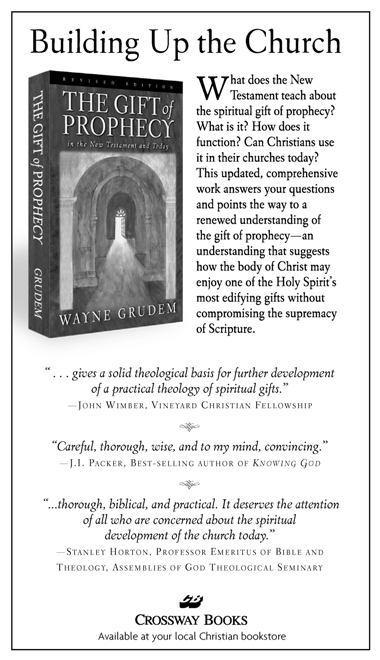The Duration of Prophecy: How Long Will Prophecy Be Used in the Church? (Part 3) by Wayne A. Grudem
Now if the apostles were the foundation of the church, and if they had a unique authority to write Scripture for the church for all time, then it is understandable that the office of apostle would not continue beyond the first century, when the last apostle died. In fact, Paul suggests that he is the last one who will ever be appointed as an apostle (see 1 Cor. 15:8, in a context of resurrection appearances to apostles). So we may say either that the office of apostle is no longer present in the church, or (perhaps more correctly) that the office of apostle has now been replaced by the presence of the writings of the apostles (the New Testament) in the church.
But we have no reason to expect that any other gifts have been replaced in this way. In fact, if spiritual gifts are characteristic of the New Covenant age, then our expectation would be that a normally functioning New Covenant church would have the continuing experience of all the gifts mentioned in the New Testament, and that these gifts, characteristic as they are of the church age, would continue in the church up until the time of the Lord’s return. Where the Holy Spirit is at work in New Covenant power, should we not rightly expect to see all the gifts of the Holy Spirit present and functioning in the church?
Summary
In 1 Corinthians 13:8-13 Paul tells the Corinthians that prophecy will continue until but not beyond the time when Christ returns. Thus, it is acceptable to paraphrase 1 Corinthians 13:10, “When Christ returns, the gift of prophecy will cease.” This text, together with the nature of prophecy as not equal to Scripture in authority but valuable for the edification of the church, leads us to conclude that the gift of prophecy will continue to be valid and available for Christians to use right up until the time when the Lord returns.
Application for Today
Once we are aware that prophecy is a gift appropriate for the entire church age (from Pentecost until Christ’s return), we should want to think about how we might encourage its use in our own lives and churches today. If indeed it is God’s intention that this gift continue to be used in the church, then our failure to allow or encourage its use can only result in our spiritual detriment, and we can expect, if we follow scriptural guidelines and avoid abuses, that its renewed use will bring added spiritual blessing and vitality to our churches.
PR
Notes
14. George Mallone, ed., Those Controversial Gifts (Downers Grove, Ill.: InterVarsity, 1983), 21.
15. John F. MacArthur, Jr., The Charismatics: A Doctrinal Perspective (Grand Rapids, Mich.: Zondervan, 1978), chapters 2–6; see especially pages 27ff.
16. Don Basham, “Questions and Answers,” New Wine 9:1 (January 1977): 29.
17. Michael Harper, Prophecy: A Gift for the Body of Christ (Plainfield, N.J.: Logos, 1964), 26.
18. Dennis and Rita Bennett, The Holy Spirit and You (Eastbourne, England: Kingsway; and Plainfield, N.J.: Logos, 1971), 107.
19. Donald Gee, Spiritual Gifts in the Work of Ministry Today (Springfield, Mo.: Gospel Publishing House 1963), 51-52.
20. Bridge, Signs and Wonders Today, 183.
21. Donald Bridge and David Phypers, Spiritual Gifts and the Church (Downers Grove, Ill.: InterVarsity, 1973), 64.
22. Gaffin, Perspectives, 120. Gaffin also allows for the possibility of an unreliable spoken response to something that had been revealed by the Holy Spirit (at least at the time of the New Testament). (See page 66, on Acts 21:4.) But if someone could give an unreliable spoken response to a revelation in the time of the New Testament, could people not do that today as well? And could that not be what is happening in prophecy?
23. Reymond, Continuing Revelations and Miracles, 28-29.
24. Bridge, Signs and Wonders Today, 204.

“The Duration of Prophecy” is Chapter 12 of The Gift of Prophecy in the New Testament and Today by Wayne A. Grudem, Copyright © 1988, 2000, Revised Edition, Pp. 400. Used by permission of Crossway Books, a division of Good News Publishers, Wheaton, Illinois 60187. Publisher’s page.
Category: Fall 2001, Pneuma Review, Spirit


